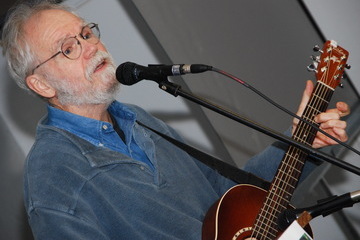Bulletin News

04/02/2018
In the vastness of history, some struggles are lesser known than others, threatening to be forgotten if their stories are not told. One such struggle was the conflict between striking copper laborers and the industrial barons who violently oppressed them during the onset of World War I.
Charlie King, an award-winning singer/songwriter and political satirist, will bring a multimedia performance on the subject to SUNY Cortland on Thursday, April 5.
“Our interest is to unearth histories that are hidden through cultural renderings,” said Colleen Kattau, associate professor of Spanish. Kattau, a folk musician herself, has previously worked with King and helped bring him to campus.
“We’re highlighting aspects of history that the official history might not inform us of — hidden histories that are nevertheless important,” she said.
The performance, titled “1917/Copper! WWI and the War on Labor”, will begin at 12:30 p.m. in the Old Main Colloquium. King will perform for about 45 to 60 minutes, after which he will facilitate a group discussion. Candace Cassin, a teacher at Insight Meditation Center in Easthampton, Mass., will assist King’s performance.
King has produced folk music since 1976 and is the recipient of numerous awards. He aims to educate people on overlooked parts of U.S. history and raise awareness for humanitarian issues and social causes. Kattau said that his performances educate in a poignant way, carrying much more emotional impact than just a lecture.
King will incorporate images and dramatic readings of historical documents into his performance, but the most crucial facet will be his original songs. A passionate singer and guitarist, he will use his music to convey the struggle of copper miners in their quest to obtain better working conditions and basic human rights.
“History is always written from the perspective of those in power,” Kattau said. “They determine what gets written and how it gets written. It’s up to the people to tell their own stories.”
The war on labor is one such overwritten story. In June 1917, a disaster at the Granite Mountain Speculator Mine in Butte, Mont., ignited the conflict between the miners and the industrialists who sought to control them. An accidental fire spread throughout the mine during the inspection of a fallen cable and 168 miners were killed in what is still considered the deadliest underground hard rock mining incident in U.S. history. Some of the miners suffered heinously as they slowly asphyxiated over several days. Only a handful could be rescued.
In the wake of this disaster, copper miners participated in large-scale strikes to negotiate safer working conditions. This did not sit well with industrialists, especially since the demand for copper was very high at the onset of World War I. Copper barons struck back at the miners in a number of ways, culminating with the July 1917 actions of the mining company Phelps Dodge Corporation in Bisbee, Ariz. A posse forced about 1,300 strikers and their supporters onto train cars and after a 16-hour ride with no food or water, the kidnapped persons were deposited in New Mexico and stranded. The mass kidnapping had been organized by Phelps Dodge — which had colluded with the Bisbee sheriff’s department — in retaliation for the mining strikes. The U.S. Department of Justice arrested 21 Phelps Dodge executives and local law enforcement leaders but none were charged.
Kattau pointed out parallels between these incidents and events that are happening in the U.S. today, comparing the Bisbee deportations with some current tactics used by Immigration and Customs Enforcement.
“There are these uncanny similarities between then and now,” Kattau said. “The myth is that we would never do these things, but the fact is that we do them all the time.”
Kattau also drew parallels between the unions of the early 20th century and today, and the constant battle that labor unions must wage to retain power and influence over working conditions. Kattau cited the deterioration of mining conditions and the resurgence of black lung disease among coal miners.
“There’s been an eroding of union power,” Kattau said. “These rights are givens in other countries but a constant struggle for us.”
Kattau believes students will benefit greatly from educational and impactful performances like King’s.
“In these turbulent times, it’s important for students to know that there’s a history of struggle for equality and justice,” Kattau said. “If you know your history, then it’s going to help you create a better future for yourself and for others.”
The performance is co-sponsored by the Economics, History, Modern Languages, and Philosophy departments, the Center for Peace and Social Justice, and the Center for Gender and Intercultural Studies. Contact Kattau at 607-753-2025 for more information.
Prepared by Communications Office writing intern Ben Mayberry

